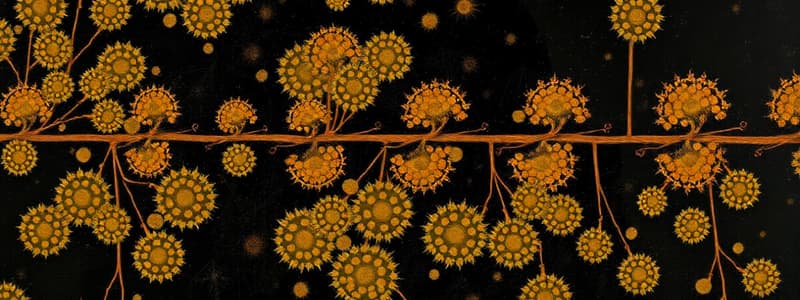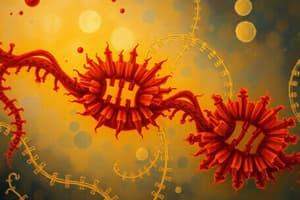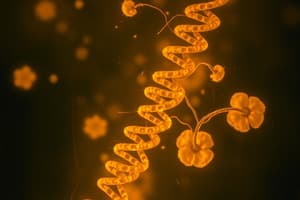Podcast
Questions and Answers
What is the primary role of chromatin remodeling in eukaryotic gene regulation?
What is the primary role of chromatin remodeling in eukaryotic gene regulation?
- To enhance protein synthesis
- To protect DNA from degradation
- To facilitate access to transcription machinery (correct)
- To condense DNA for storage
Which of the following best describes alternative splicing?
Which of the following best describes alternative splicing?
- The process of modifying histones to influence gene expression
- The synthesis of different proteins from the same gene transcript (correct)
- The conversion of DNA to RNA
- The repression of transcription by silencing elements
How do enhancers affect gene expression?
How do enhancers affect gene expression?
- By silencing adjacent genes
- By providing binding sites for transcription factors (correct)
- By increasing the stability of mRNA transcripts
- By directly initiating transcription
What modification is typically associated with active transcription in histones?
What modification is typically associated with active transcription in histones?
In the context of gene expression dynamics, what is the significance of spatial regulation?
In the context of gene expression dynamics, what is the significance of spatial regulation?
Which mechanism primarily influences epigenetic regulation?
Which mechanism primarily influences epigenetic regulation?
What impact does transcription factor binding have on eukaryotic gene regulation?
What impact does transcription factor binding have on eukaryotic gene regulation?
Which of the following correctly characterizes the relationship between gene expression dynamics and environmental responsiveness?
Which of the following correctly characterizes the relationship between gene expression dynamics and environmental responsiveness?
What is the primary function of steroid hormones in gene regulation?
What is the primary function of steroid hormones in gene regulation?
Which type of genes are typically switched on by an inducer?
Which type of genes are typically switched on by an inducer?
What is characteristic of genes that are classified as repressible?
What is characteristic of genes that are classified as repressible?
In the operon model of gene regulation, where is the regulatory region usually located?
In the operon model of gene regulation, where is the regulatory region usually located?
What defines cis-acting elements in gene regulation?
What defines cis-acting elements in gene regulation?
What is the role of the lac repressor in E.coli?
What is the role of the lac repressor in E.coli?
Which best describes constitutive genes?
Which best describes constitutive genes?
What is the role of transcription factors in prokaryotic operons?
What is the role of transcription factors in prokaryotic operons?
What happens to the lac operon when lactose is present and glucose is absent?
What happens to the lac operon when lactose is present and glucose is absent?
How does the presence of tryptophan affect the trp operon?
How does the presence of tryptophan affect the trp operon?
What role does cAMP-CAP play in the lac operon regulation?
What role does cAMP-CAP play in the lac operon regulation?
Which mechanism limits the expression of the trp operon when tryptophan levels are high?
Which mechanism limits the expression of the trp operon when tryptophan levels are high?
What is the state of the trp operon when tryptophan is absent?
What is the state of the trp operon when tryptophan is absent?
In the absence of glucose, what is the effect of the cAMP-CAP complex?
In the absence of glucose, what is the effect of the cAMP-CAP complex?
What is an effect of tryptophan on the allosteric repressor of the trp operon?
What is an effect of tryptophan on the allosteric repressor of the trp operon?
What triggers transcription to stop in the trp operon when tryptophan levels are sufficient?
What triggers transcription to stop in the trp operon when tryptophan levels are sufficient?
Study Notes
Gene Regulation in Prokaryotes: Operons
- Prokaryotic gene regulation primarily occurs at the level of transcription.
- Operons are groups of genes expressed together, controlled by a single regulatory region located upstream of the genes.
- Regulatory regions are cis-acting elements, meaning they reside on the same DNA strand as the genes they control.
- Transcription factors are trans-acting elements, meaning they are mobile factors that can act on genes located elsewhere on the genome.
The Lac Operon of E. coli
- E. coli bacteria preferentially use glucose as an energy source.
- They can metabolize lactose, but only when glucose is unavailable.
- The lac operon encodes enzymes for lactose uptake and metabolism.
- The lac operon is expressed when lactose is present and glucose is absent.
- Two regulatory proteins control lac operon transcription:
- The lac repressor: acts as a lactose sensor.
- CAP (catabolite activator protein): acts as a glucose sensor.
Lac Operon Regulation: Lactose and Glucose Sensing
- No lactose: The lac repressor binds to the operator, preventing transcription of the lac operon genes.
- Lactose present & no glucose: Allolactose (a lactose isomer), binds to the lac repressor, preventing the repressor from binding to the operator. cAMP (cyclic adenosine monophosphate) levels rise in the absence of glucose. cAMP binds to CAP, which then binds to the promoter. This complex enhances RNA polymerase binding and transcription of the lac operon genes.
- Lactose & glucose both present. Allolactose binds to the lac repressor, preventing it from binding to the operator. Glucose inhibits cAMP production, preventing CAP from binding to the promoter. This weak RNA polymerase binding leads to low levels of transcription, and lactose is not metabolized.
The Tryptophan Operon
- The trp operon encodes enzymes involved in tryptophan biosynthesis.
- It is a repressible operon – it is expressed when tryptophan levels are low and repressed when tryptophan levels are high.
- The trp repressor is a regulatory protein that binds tryptophan and acts as a sensor.
- When tryptophan binds to the repressor, it undergoes an allosteric shift (change in shape), enabling it to bind to the operator, repressing transcription.
Trp Operon Attenuation
- Attenuation is a regulatory mechanism that reduces trp operon expression when tryptophan levels are high.
- This mechanism does not block transcription initiation, but instead prevents transcription completion.
- It is controlled by a leader sequence within the trp mRNA transcript.
- The leader sequence encodes a short peptide with two tryptophan residues.
- The leader sequence can fold into two different stem-loop structures, one allowing transcription to proceed and the other causing termination.
- The rate of translation of the leader peptide determines the stem-loop structure formed and influences transcription completion.
Trp Operon Attenuation: Tryptophan Presence and Absence
- Tryptophan present:
- Abundant tryptophan-charged tRNA allows for rapid translation of the leader peptide.
- The ribosome quickly translates the leader sequence, causing the formation of a stem-loop structure that prevents transcription continuation.
- Tryptophan absent:
- Scarce tryptophan-charged tRNA slows translation of the leader peptide.
- The ribosome stalls at the tryptophan codons in the leader sequence.
- This stalling prevents the ribosome from associating with domain 2 of the leader sequence and permits the formation of a stem-loop structure that allows transcription to continue.
Studying That Suits You
Use AI to generate personalized quizzes and flashcards to suit your learning preferences.
Related Documents
Description
Explore the intricate mechanisms of gene regulation in prokaryotes, focusing specifically on operons. Learn how the lac operon of E. coli functions, including the roles of the lac repressor and CAP in regulating lactose metabolism. This quiz will test your understanding of these fundamental biological concepts.




